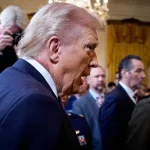

It’s been nine months since President Joe Biden’s administration insisted a new nuclear agreement with Iran would have to be concluded within “weeks” or it would be pointless to finalize a pact.
“If a deal is not reached in the next few weeks, Iran’s ongoing nuclear advances will make it impossible to return to the JCPOA,” said Secretary of State Antony Blinken in February, using the shorthand for the Joint Comprehensive Plan of Action.
The administration has argued whatever the flaws of the 2015 agreement between Iran and six world powers, its provisions, including an intrusive inspection regime, would forestall the day when Iran would be capable of producing a nuclear weapon.
“I think it’s important that we can verify the activities in Iran, and a deal would provide us with that opportunity,” said Rafael Grossi, director-general of the International Atomic Energy Agency, the United Nations watchdog agency that would conduct the inspections. “We do hope, as in any diplomatic negotiations, that the sides will come to see eye to eye.”
For months now, the U.S., which has been unable to negotiate directly with the Iranians, has believed a deal was close, only to have Tehran add some new, last-minute demand.
All the while, Iran has been stiff-arming the IAEA as well, refusing to answer questions about manmade uranium particles found at undeclared sites and demanding the IAEA end its investigation into whether the radioactive traces might be evidence of a nuclear weapons program.
While hopes for a deal are again fading, the administration is not giving up.
“Like all negotiations, this one has and continues to include back and forth,” said John Kirby, the National Security Council’s coordinator for strategic communications. “Suffice it to say, there’s still gaps, and we’re just not there yet … there’s still quite a bit of work for our diplomats to do.”
After Iran and EU negotiators agreed last month on what was supposed to be a “final text,” Iran requested new provisions to impose a “heavy price” if some future U.S. president exited the deal, as President Donald Trump did in 2018.
And Tehran also wanted assurances that should the U.S. reimpose sanctions, other Western companies would still be permitted to do business with Iran.
The eleventh-hour Iranian demands were described as “not constructive” by Vedant Patel, deputy spokesperson at the State Department.
“It is unfortunate that Iran’s response was, to us, took us backward. And we, of course, are not going to conclude a deal that is not in the U.S. national security interest. But this is something that we’re continuing to pursue,” he said at briefings. “Iran’s response did not put us in a position to close the deal.”
Many experts argue the time when it made any sense to return to the original agreement has long passed, especially since some of the key provisions, such as restrictions on advanced centrifuges, are set to expire or “sunset” in the next year or two.
“Iran’s nuclear progress since 2015, and particularly since Biden’s election, is beyond the point of containment,” according to a recent analysis by the Foundation for the Defense of Democracies. “The regime’s nuclear advances have rendered a return to the old agreement futile.”
In February, Sen. Bob Menendez (D-NJ), chairman of the Foreign Relations Committee, an opponent of the original deal, delivered a floor speech pointing out that according to the IAEA, Iran is now enriching uranium beyond any civilian application, up to 60% purity, and is a short, technical step away from the 90% needed for a nuclear bomb.
“In other words, Iran has already done most of the heavy lifting,” Menendez said. “Iran’s consistent obfuscation, continual stalling, and outlandish demands have left us flying blind.”
Iran’s “breakout time” — the time it would take for it to produce a nuclear bomb — has shrunk from an estimated four weeks earlier this year, practically to zero.
Congressional opposition to a revived deal has been building, notably among Democrats as well as Republicans, as Iran has continued to attack U.S. interests in the region and more details of the potential deal leak out.
According to an analysis by the Jewish Institute for National Security of America, Iran’s chief negotiator, Ali Bagheri Kani, told the Iranian Parliament last month that U.S. sanctions relief is designed partially to circumvent congressional review under the 2015 Iran Nuclear Agreement Review Act, which requires the president to submit to Congress any agreement and all related documents.
“The Iranians disclosed that the first step of the deal before the State Department submits the text to Congress, would entail President Biden lifting sanctions under three executive orders,” the JINSA analysis said, citing a leaked audio recording. “In total, over 170 individuals and entities could be removed from U.S. sanctions before congressional review.”
“Let me make this clear. This deal with Iran will be dead on arrival in a Republican-controlled Congress, and Congress will strengthen sanctions against Iran,” said Rep. Mike Rogers (R-AL), lead Republican on the House Armed Services Committee. “Any assurances to the contrary that the Biden administration gives to Mullahs in Tehran is worth less than the paper it’s written on.”
But blocking the deal may not hinge on Republicans controlling Congress.
A growing number of Democrats are becoming uneasy over the outlines of a deal that seems to give away too much for too little.
In a letter this month, 50 members of Congress, 34 Democrats and 16 Republicans, wrote President Joe Biden saying they were “deeply concerned about multiple provisions that reportedly may be contained in the final language of any agreement” and requesting the White House “provide Congress with the full text of any proposal to rejoin the Iran nuclear agreement … including any side agreements, and consult with Congress prior to reentering that agreement.”
Iranian intransigence has stalled the negotiations once again, with the best guess being that the soonest a deal could be struck is after the November midterm elections.
Meanwhile, Iran continues what the U.S. calls its “malign activities,” plotting to assassinate former national security adviser John Bolton, targeting U.S. troops in Syria, and seizing a U.S. drone ship in the Arabian Gulf.
The White House argued the events are not linked.
“The JCPOA is to deal with the Iranian pursuit of a nuclear weapons capability and only that,” said NSC spokesman Kirby. “It’s not meant to deal with other Iranian malign activities.”
But Republicans are vowing to do everything possible to kill the deal for good.
“Iran’s attempts to assassinate American officials and dissidents on American soil should immediately disqualify them from any sanctions relief from the United States,” Rogers said.
“Yet, the Biden administration is working overtime to broker a deal that will provide billions of dollars to the world’s largest state sponsor of terrorism. Providing Iran with the money they need to advance towards a nuclear weapon, expand its terrorist network, and aid Vladimir Putin at the same time, is a mistake that will cost lives.”
Jamie McIntyre is the Washington Examiner’s senior writer on defense and national security. His morning newsletter, “Jamie McIntyre’s Daily on Defense,” is free and available by email subscription at dailyondefense.com.







